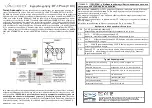
Intel
®
E7500 and Intel
®
E7501 Chipsets MCH Thermal Design Guide
Thermal Design Guide
11
4.0
Thermal Specifications
4.1
Power
See
for TDP specifications for the Intel
®
E7500 MCH and the Intel
®
E7501 chipset MCH.
FC-BGA packages have poor heat transfer capability into the board and have minimal thermal
capability without thermal solutions. Intel recommends that system designers plan for one or more
heat sinks when using the Intel E7500 or Intel E7501 chipset components.
4.2
Die Temperature
To ensure proper operation and reliability of the Intel E7500 and Intel E7501 chipset MCHs, the
die temperatures must be at or below the values specified in
for
guidelines on accurately measuring package die temperatures.
Table 3. Intel
®
E7500 and Intel
®
E7501 Chipsets MCH Thermal Specifications
Device
Parameter (Maximum)
T
die-hs
TDP
Intel
®
E7500 Chipset MCH
102° C
7.5 W
Intel
®
E7501 Chipset MCH
(Paired with Intel
®
Xeon
™
processor or Low Voltage
Intel
Xeon processor, dual channel memory
configuration)
105° C
8.5 W
Intel E7501 Chipset MCH
(Paired with Intel Xeon processor or Low Voltage
Intel
Xeon processor, single channel memory
configuration)
105° C
7.8 W
Intel E7501 Chipset MCH
(Paired with Intel
®
Pentium
®
M processor, dual
channel memory configuration)
105° C
7.1 W
Intel E7501 Chipset MCH
(Paired with Intel Pentium M processor, single
channel memory configuration)
105° C
6.2 W
†
T
die-hs
is defined as the maximum die temperature with the reference thermal solution attached.












































